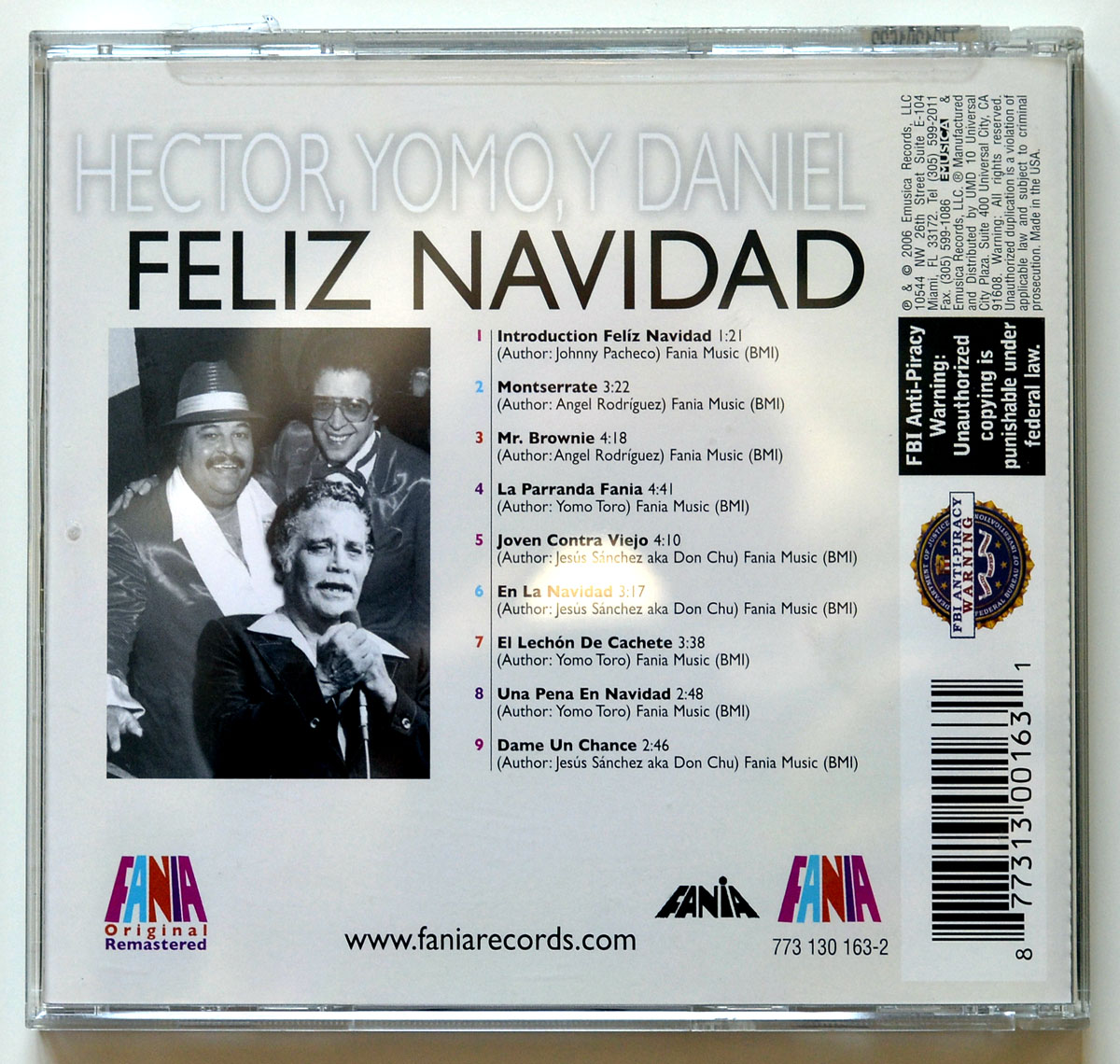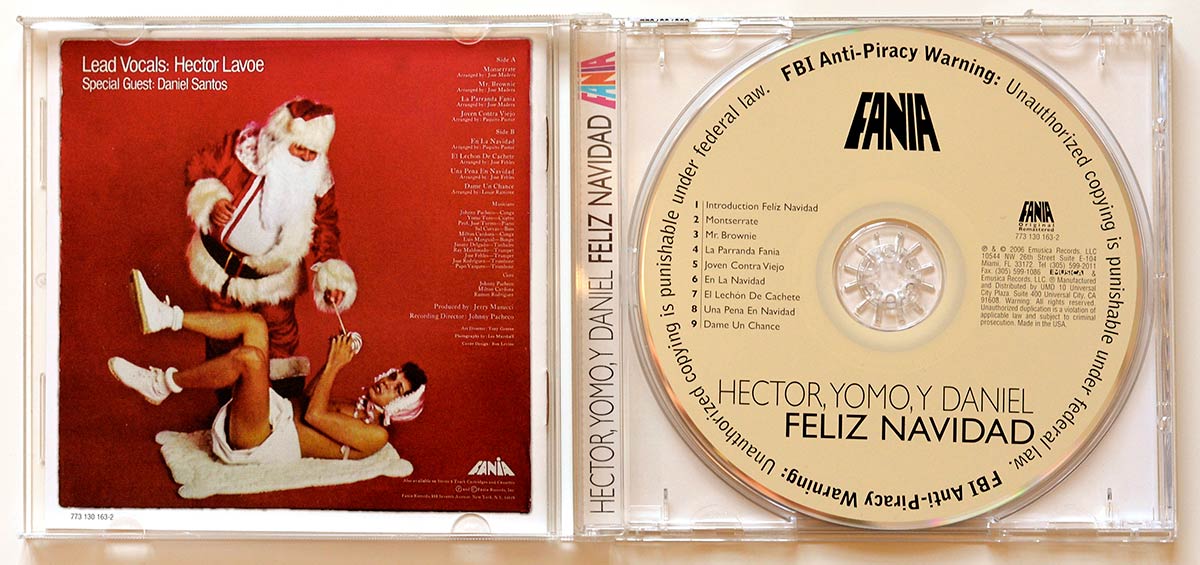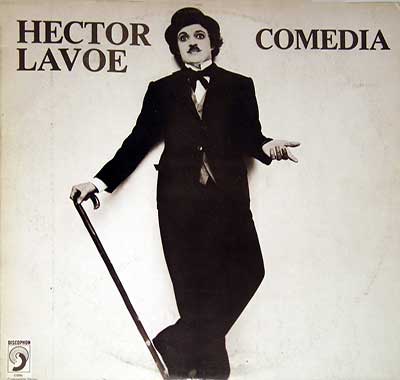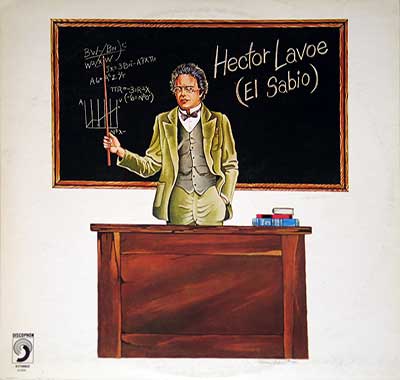HECTOR, YOMO Y DANIEL - Feliz Navidad music CD ( Compact Disc )
Hector Lavoe with Yomo Toro and Daniel "El Jefe" Santos

Hector Lavoe with Yomo Toro and Daniel "El Jefe" Santos

Latin, Salsa, Christmas
Fania Records – 773 130 163-2
2006 USA

Note: The images on this page are photos of the actual album. Slight differences in color may exist due to the use of the camera's flash. Images can be zoomed in/out ( eg pinch with your fingers on a tablet or smartphone )


Héctor Lavoe was a true icon of the salsa genre, whose music and legacy continue to inspire and influence musicians and fans around the world. Despite the personal challenges he faced, his voice and his passion remain a testament to the power of music to transcend borders, cultures, and even tragedy.
Héctor Lavoe was the greatest salsa singers of all time. Born in Ponce, Puerto Rico in 1946, he moved to New York City in the 1960s and became a central figure in the burgeoning salsa scene. His powerful voice, distinctive phrasing, and passionate delivery made him an icon of the genre.
Lavoe's music was rooted in the African rhythms of his homeland, but he also drew inspiration from American soul and R&B, as well as the Latin jazz that was popular in New York at the time. He first gained fame as a member of the Fania All-Stars, a supergroup of salsa musicians assembled by Fania Records, the label that helped popularize the genre in the United States.
Lavoe's solo career began in earnest in the early 1970s, with a string of hit albums that showcased his dynamic range and emotional depth. His music tackled social and political issues, such as the struggles of Puerto Rican immigrants in New York, as well as more personal themes of love, heartbreak, and redemption.
One of Lavoe's most enduring hits is "El Cantante," a biographical song that tells the story of his rise to fame and the personal demons that haunted him throughout his life. The song's lyrics, which were written by Rubén Blades, are a poignant reminder of the toll that success can take on an artist.
Despite his success, Lavoe's personal life was marked by tragedy and turmoil. He struggled with drug addiction and depression, and his first wife, Juana, died in a car accident in 1967. His second wife, Puchi, was a stabilizing influence on him for many years, but their relationship was also fraught with difficulties.
Lavoe's career was also affected by the decline of the salsa genre in the 1980s, as well as the growing popularity of reggaeton and other Latin music styles. He continued to perform and record, but his health began to deteriorate, and he was diagnosed with HIV in the mid-1980s.
Lavoe passed away in 1993 at the age of 46, leaving behind a legacy of music that continues to inspire and influence new generations of salsa artists. His voice and his spirit live on in songs like "Mi Gente," "Periodico de Ayer," and "De Ti Depende," which remain beloved classics of the genre.
In recent years, Lavoe's life and music have been the subject of several films and documentaries, including the 2006 biopic "El Cantante," which starred Marc Anthony as Lavoe and Jennifer Lopez as Puchi. These films have helped to introduce a new generation of fans to Lavoe's music and to celebrate his enduring legacy as one of the greatest salsa singers of all time.

Fania Discophon 6096 , 1980 , Spain
Hector Lavoe's "Comedia" on the Fania Records 12" Vinyl LP Album, in collaboration with Willie Colon, epitomizes the vibrant salsa scene of the 1970s. Released during a tumultuous yet culturally rich time, this masterpiece showcases Lavoe's distinctive voice and Colon's innovative arrangements. Fania Records, a pivotal label in Latin music, played a pivotal role in propelling salsa to international prominence during this era.
Learn more
Discophon 6109 , 1980 , Spain
"Héctor Lavoe's 'El Sabio,' a 1980 12" Vinyl LP, epitomizes the golden era of salsa. Produced by Willie Colón and Jerry Masucci, it reflects the genre's evolution in the late 1970s. Lavoe's emotive vocals, coupled with Colón's innovative arrangements, create a sonic masterpiece. Released in Spain, it contributed to salsa's global appeal, marking a significant cultural and musical milestone in the genre's history."
Learn more